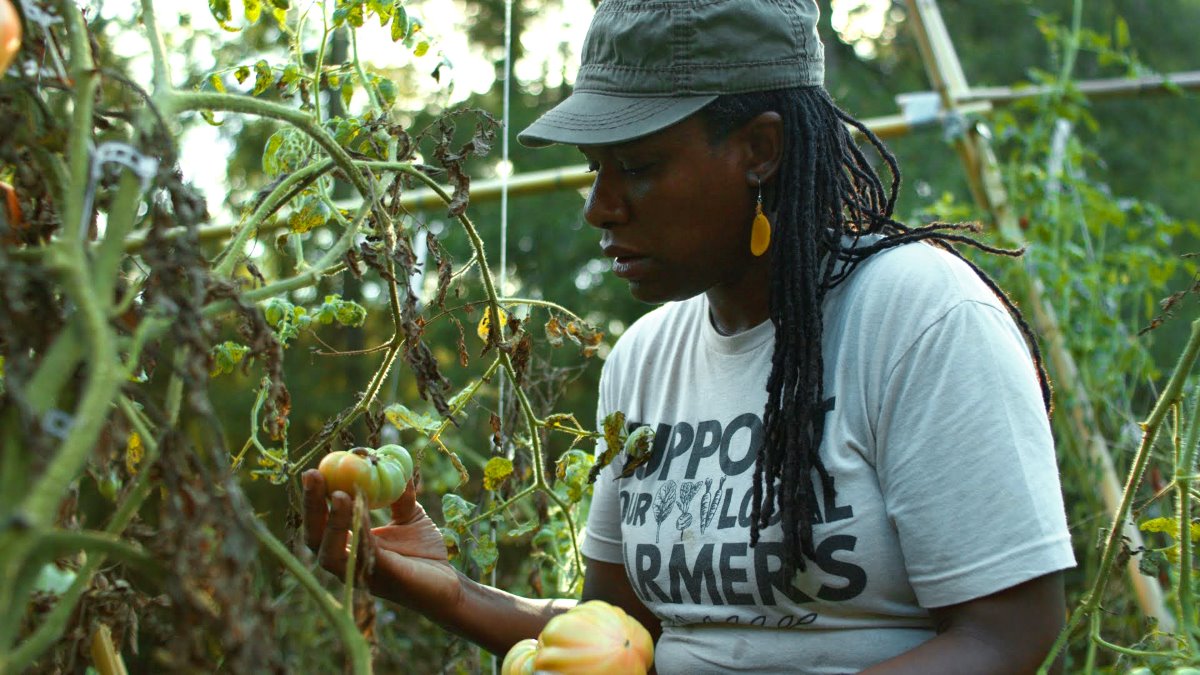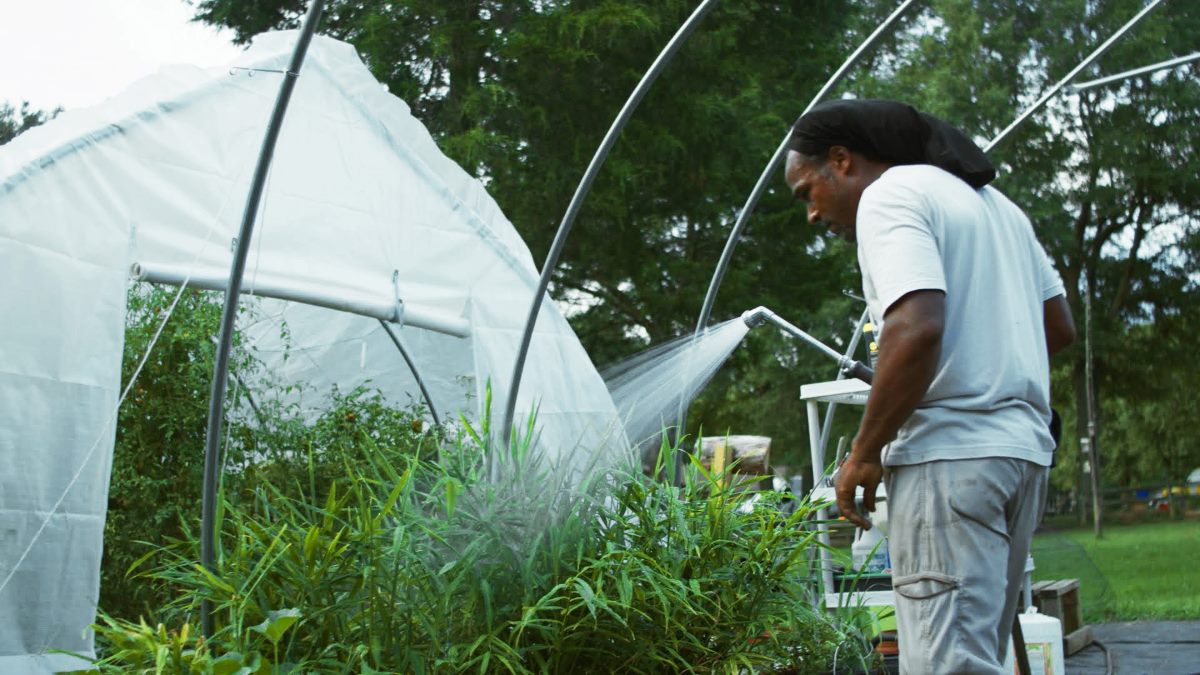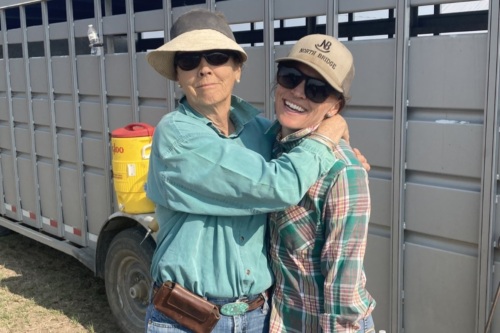
Top 5 Stories Worth Reading — March 2025
Mar 31, 2025
 Cherie Jzar picking tomatoes on her farm. Photo Credit: Allen Baker
Cherie Jzar picking tomatoes on her farm. Photo Credit: Allen Baker
— Cherie Jzar
On seven acres in Charlotte, North Carolina, Cherie Jzar, an urban farmer, Black woman, and mom of five, is helping to shape the future of farming.
Cherie and her family run Deep Roots CPS Farm, an urban farm that provides produce, eggs and other goods to the community in Charlotte. The family began farming as homesteaders in 2003 when Cherie and her husband purchased their first home and wanted to grow good, nutritious food for themselves and their children. Five years later, they expanded their farm to include chickens and beehives, and a decade after that, they began selling their local, organic produce at markets in the area.
When the family decided to expand their farm, they intentionally located it “in the heart of Black Charlotte,” because they felt it was important for there to be a source of locally grown food for the community.
Far too often, communities of color lack access to fresh, nutritious food. The Jzars are passionate about closing that gap in Charlotte in a way that is sustainable and fulfills their mission to be good stewards of the land. By utilizing a variety of climate-smart agricultural practices including composting, cover cropping, and low-tilling methods “that honor the natural flow of the land,” Deep Roots is ensuring the soil stays healthy for generations to come.
When Cherie started farming, she, like many other beginning farmers, had a lot of questions but no connections to others in the industry that she could turn to for answers. And, being a Black, woman farmer, she didn’t always feel welcome in traditional farming spaces.
“I wished there was a community that I could have reached out to in some way,” she said. At the time, that type of community didn’t really exist for Black, Brown, and Indigenous farmers.
So, they made one. Cherie and others created a “growers network” including people ranging from backyard gardeners to large-scale farmers. The network has monthly meetings that allow growers to connect, ask questions, and learn from one another. The group is open to everyone, and prioritizes the needs of Black, Brown, and Indigenous growers.
The Jzars’ commitment to providing their community with healthy food is as strong as ever, but in recent years, they’ve had to adjust the way the farm operates in the face of increasingly unpredictable and extreme weather.
Cherie says they’ve “had to manage with mother nature” through extreme heat, extreme cold, drought, and flash flooding. In doing so, they’ve learned to adjust watering schedules, harvest crops early, and shift a lot of their growing to structures like hoop houses that give them more control over growing conditions.
 Wisdom Jzar waters ginger in a hoop house that was damaged the previous day by high winds from a storm. Photo Credit: Allen Baker
Wisdom Jzar waters ginger in a hoop house that was damaged the previous day by high winds from a storm. Photo Credit: Allen Baker
Making adjustments to sustain a farm in the face of climate change isn’t easy – or cheap. Farmers like Cherie rely on funding and technical assistance from federal programs like those funded through the Farm Bill to maintain their farms and ensure they can continue providing fresh, nutritious food to their communities. Typically passed every five to six years, the Farm Bill is a legislation package that updates and funds federal agricultural, conservation, and food policy, including many programs run by the U.S. Department of Agriculture (USDA).
In addition to utilizing funding for equipment, Deep Roots has received technical assistance from the USDA through its conservation programs. They also recently applied for the USDA’s Conservation Stewardship Program funding to create a rotational grazing pasture that would help ensure their land is as healthy as possible.
Without these programs, Cherie says, “there would be a lot of challenges. Without resources, it’s tough for farmers…If we lose that funding, there will be a whole lot of struggling farmers out there, no doubt,” she said.
In 2022, President Biden’s landmark climate law, the Inflation Reduction Act, injected an additional $20 billion into the USDA’s conservation programs to fund climate smart agricultural practices. These programs always get more applications for assistance than they are able to fulfill. This new funding is critical to help ensure more farmers who want to engage in climate-smart agriculture practices are able to. But right now, as Congress negotiates the reauthorization of the Farm Bill, opponents of the President’s climate agenda are trying to cut or redirect this critical funding away from farmers and conservation programs. That could have devastating consequences for growers like Cherie and her network, as well as farmers nationwide, and for all of us who want to ensure farmers are part of the climate solution.
Tell Congress: we must protect funding for climate-smart agriculture in the 2023 Farm Bill so farmers, like Cherie, can continue to provide their communities with healthy, nutritious food for generations to come.
Next in the Climate-Smart Agriculture Series:
